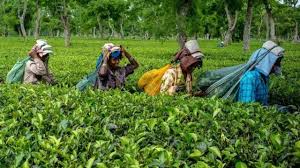Climate Change Fuels Spread of Plant Pests
Tea plantations in India are facing unprecedented challenges as the tea mosquito bug, typically confined to low elevation areas, is spreading to high elevation plantations due to climate change. The bug’s expansion has resulted in significant decreases in tea production and increased pesticide usage. Not only tea but other crops like wheat, millets, vegetables, and pulses are also suffering from escalating pest attacks.
A warming world is allowing pests to extend their territories, impacting food security and crop yields. Factors such as altered lifecycles, changes in rainfall patterns, and elevated carbon dioxide levels contribute to the proliferation of pests. To combat this issue, experts emphasize the need for climate-resilient crops, effective pest management strategies, and continuous research to ensure food production and agricultural sustainability.
Why is the tea mosquito bug becoming a major concern in Indian tea plantations?
The tea mosquito bug, previously confined to low elevation areas, is now spreading to high elevation tea plantations due to climate change. This expansion has caused significant declines in tea production, leading to economic losses for tea growers in both northern and southern states.
How has climate change contributed to the changing behavior of pests like aphids?
Climate change affects aphid behavior by altering their lifecycles and migration patterns. Higher temperatures prompt aphids to hatch sooner and exhibit extended flight times, which increases their range. This shift in behavior impacts crops, making them more vulnerable to pest attacks.
What challenges do changing rainfall patterns pose for pest management?
Changing rainfall patterns have extended the duration of pests like aphids and aphid-related diseases. The increase in rainfall can create favorable conditions for pest survival and reproduction, leading to prolonged attacks on crops.
How does elevated carbon dioxide levels affect pest behavior?
Elevated carbon dioxide levels enhance photosynthesis in plants, resulting in higher sugar and starch content in leaves. This excess nutrition can attract herbivorous insects, facilitating their propagation and leading to increased pest attacks on crops like wheat, rice, and cotton.
Why are pests becoming more resilient to traditional pest control methods?
Pests are adapting to changing conditions and becoming more resistant to traditional pest control methods, partly due to their altered lifecycles. Insects’ faster mutation rates enable them to evolve rapidly, outpacing the ability of natural predators to control their populations effectively.
What measures can mitigate the impact of climate change on pest outbreaks?
Implementing climate-resilient crop varieties, practicing effective pest management, raising awareness about pest behavior changes, and investing in research to develop new pest control strategies are essential. These measures can help minimize the effects of climate change on crop yield and food security.
Month: Current Affairs - August, 2023
Category: Environment Current Affairs


